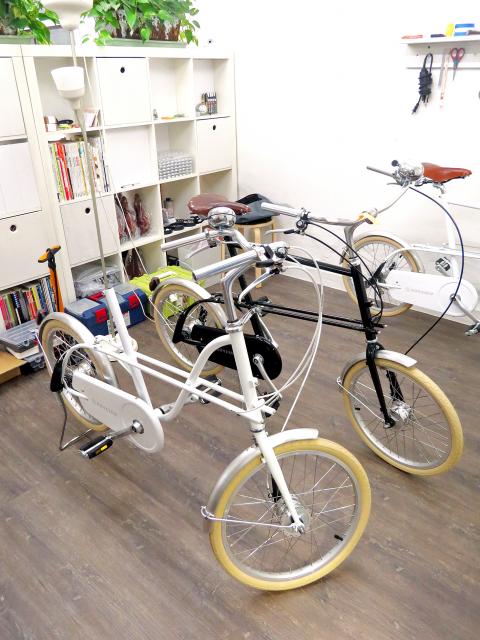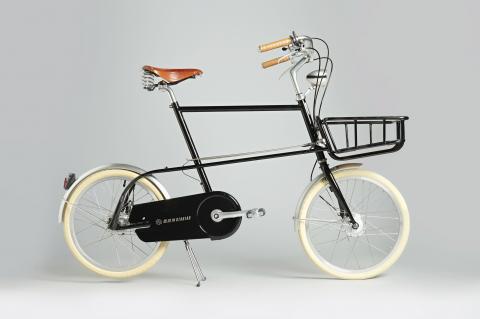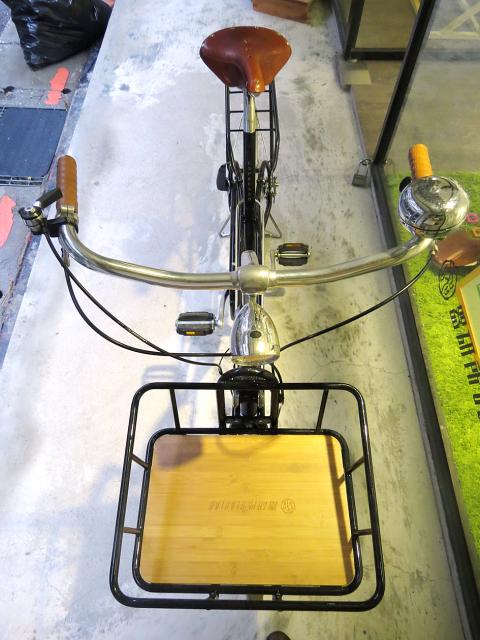In Taiwan’s bicycle manufacturing industry, research and development is concentrated in road bikes, which enjoy a high profit margin. Ninety percent of Giant’s catalog is mountain bikes, road bikes and racing bikes, and last year leaders like Merida vied to release lightweight racers for export to western countries.
However, Henry Chang (張博翔) and Cesare Sun (孫崇實), whose bike design won this year’s Golden Pin Design Award, believe that the future of the industry is not in road bikes.
“A focus in urban cycling will be the next trend of bike development,” says Chang, an industrial designer. “The [road] bike market is already saturated.”

Photo: Enru Lin, Taipei Times
Last year was notably tough for Taiwanese manufacturers. Exports to the US — a main market — fell 8 percent, costing manufacturers an estimated US$43 million in lost sales at wholesale, according to the US Department of Commerce.
In their race to bring road bikes to western markets, Taiwanese industry leaders have ignored the potential of the commuter bike aimed at the urban Asian market, the designers say.
They argue that using a road bike for urban commuting is overkill and a source of dangerous problems. For example, the handlebars of a mountain bike force the cyclist into a forward-leaning position, which partially obstructs the view of traffic.

Photo courtesy of Gearlab
“Holland and Denmark do make bikes that are perfect for riding to work. But because Caucasian and Asian bodies are proportioned differently, those bikes aren’t a good solution for us,” Chang says.
“So there’s a huge market opportunity here, but not many people are looking into it,” Chang says.
TWO MEN AND A BIKE

Photo: Enru Lin, Taipei Times
Chang and Sun stood out as the only two designers in a sea of engineer hires at local computer manufacturer Asustek Computer Inc (華碩). Later, they drew notice as enthusiastic eco-conscious young men who rolled up to the office on bikes.
“Commuting in cities by bike is really a point of pride,” Sun says.
Chang agrees. After three years at Asustek, the two were hired at the same time by Demos Chiang’s (蔣友柏) Dem Inc to design bikes under contract for Giant.
“That’s all we wanted to do — [design] bikes,” Chang says.
“First of all, it was our personal interest. Secondly, bikes are a tremendous challenge, because the appearance is the structure … When you change the appearance of the frame, you change its structure and you get a completely different effect.”
In 2008, Chang and Sun left Dem Inc to start Gearlab, named for its mission to become a star bike-design studio. For the first few years, they designed mostly teapots and mugs, struggling to build capital for developing their dream bike. In between, they conducted market research.
“We considered the different options for a long time. It wasn’t until 2011 that we knew what bike we wanted to go with,” Sun says.
Manufacturers like Giant, Merida and Fritz Jou make mid to high-end bikes for sport use that are purchased by athletes — and by urban consumers who don’t see a better option for commuting. The fold-up bicycle’s popularity in cities peaked around 2009 and, Chang says, is unlikely to return because “an easy-to-ride bike is hard to fold, and an easy-to-fold bike is hard to ride.”
This year, he and Sun put their first bike on the market. The Espresso is a non-foldable bike designed for the East Asian market, and it’s been named a winner of this year’s Golden Pin Design Award.
Unlike a mountain bike, the Espresso permits pedaling in an upright position for a better view of traffic. It also comes with a large kit of accessories tailored for the urbanite: a kickstand, chain guard, LED lights, bike lock, a cargo rack that doesn’t move with the handlebar and a bell with a jaunty two-tone ring so “pedestrians will think you’re funny instead of getting mad when you use it,” Chang says.
THE ROAD AHEAD
Chang and Sun say that for Taiwan’s bicycle manufacturing industry, the commuter bike is a very promising product that needs more development. Giant currently makes some of the best road bikes in the world, but its city-friendly bikes are far less competitive because in-house designers are hired for their background in high-performance engineering.
“Giant finds it hard to extricate itself from the [road] bike mindset. For example, in one lifestyle bike we were designing for them, we suggested adding a chain guard to prevent pant stains … Giant thought it didn’t look sporty or it would add too much weight,” Sun says.
A large company like Giant needs a fundamental shift in approach before it will be able to develop a superb commuter bike. And for a smaller design studio, the task is even tougher, Chang says.
After two years of accepting bicycle design contracts, Dem Inc wanted to move on. That’s because in the design industry, much of the money is elsewhere — for instance in gifts for exhibitions, where contracts are generous and frequent. Designing one bike, in comparison, is time-consuming and rarely cost-effective.
“It’s hard to earn money developing bike concepts,” he says. “As a result, while Taiwan manufactures many bikes, very few people are designing them.”

March 31 to April 6 On May 13, 1950, National Taiwan University Hospital otolaryngologist Su You-peng (蘇友鵬) was summoned to the director’s office. He thought someone had complained about him practicing the violin at night, but when he entered the room, he knew something was terribly wrong. He saw several burly men who appeared to be government secret agents, and three other resident doctors: internist Hsu Chiang (許強), dermatologist Hu Pao-chen (胡寶珍) and ophthalmologist Hu Hsin-lin (胡鑫麟). They were handcuffed, herded onto two jeeps and taken to the Secrecy Bureau (保密局) for questioning. Su was still in his doctor’s robes at

A vaccine to fight dementia? It turns out there may already be one — shots that prevent painful shingles also appear to protect aging brains. A new study found shingles vaccination cut older adults’ risk of developing dementia over the next seven years by 20 percent. The research, published Wednesday in the journal Nature, is part of growing understanding about how many factors influence brain health as we age — and what we can do about it. “It’s a very robust finding,” said lead researcher Pascal Geldsetzer of Stanford University. And “women seem to benefit more,” important as they’re at higher risk of

Last week the Democratic Progressive Party (DPP) said that the budget cuts voted for by the China-aligned parties in the legislature, are intended to force the DPP to hike electricity rates. The public would then blame it for the rate hike. It’s fairly clear that the first part of that is correct. Slashing the budget of state-run Taiwan Power Co (Taipower, 台電) is a move intended to cause discontent with the DPP when electricity rates go up. Taipower’s debt, NT$422.9 billion (US$12.78 billion), is one of the numerous permanent crises created by the nation’s construction-industrial state and the developmentalist mentality it

Experts say that the devastating earthquake in Myanmar on Friday was likely the strongest to hit the country in decades, with disaster modeling suggesting thousands could be dead. Automatic assessments from the US Geological Survey (USGS) said the shallow 7.7-magnitude quake northwest of the central Myanmar city of Sagaing triggered a red alert for shaking-related fatalities and economic losses. “High casualties and extensive damage are probable and the disaster is likely widespread,” it said, locating the epicentre near the central Myanmar city of Mandalay, home to more than a million people. Myanmar’s ruling junta said on Saturday morning that the number killed had